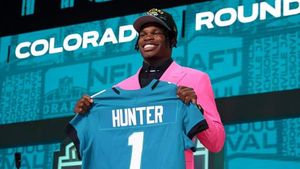Elon Musk's social media platform X has sparked controversy with its recent court filing, which claims ownership of all user accounts, including those belonging to Alex Jones’s Infowars. This legal assertion emerged amid the tumultuous backdrop of Infowars' pending acquisition by the satirical news outlet The Onion, which won the bidding war for Jones’ controversial media enterprise during its bankruptcy auction.
On November 26, 2024, X submitted what it called a "limited objection" to the attempted sale of Infowars, highlighting its policies concerning account ownership. According to reports from The Hill, the company argued users lack the authority to transfer or sell their accounts without X's explicit consent. They underscored their terms of service, stating, "X Corp.'s TOS make clear... it owns the X Accounts, as the TOS is explicit [since] X Corp. merely grants its users a non-exclusive license to use their accounts." This move stunned many, as it raises questions about account ownership, user rights, and the broader implications for social media platforms at large.
The Onion emerged victorious in the bankruptcy auction of Infowars, primarily supported by families of Sandy Hook shooting victims. These families hold over $1 billion worth of defamation judgments against Jones for his relentless promotion of the conspiracy theory claiming the tragedy was staged. The satirical site has ambitious plans to repurpose Infowars as part of its comedic roster, aiming to relaunch it as parody content this coming January.
Though the legal battle seemed straightforward, complications quickly arose. A federal judge has paused the sale for review, deciding to take more time to thoroughly examine the nature of the bids and potential conflicts of interest. Judge Christopher Lopez indicated he wanted to maintain fairness and transparency as the proceedings unfolded. This pause has left many wondering whether The Onion will be able to proceed with its acquisition or if the court might redirect the assets to another bidder or even restart the auction process.
Jones’ other bid was placed by First United American Companies, which is closely connected to him and operates under his name to market nutritional supplements. Despite being described as the underdog, this company raised eyebrows, prompting speculation about whether it aligns closely enough with Jones' interests to sway court opinions. Jones has publicly claimed the auction was tainted by collusion among The Onion, affected families, and the court-appointed trustee. He accused them of executing fraudulent schemes to secure the winning bid from The Onion.
Echoing the sentiments of many observers, Jones launched allegations of backdoor dealings through his media channels, framing the proceedings as both rigged and fraudulent. This has led to him pursuing legal avenues not just against the auction process but also against those involved, including The Onion and the trustee overseeing the sale. The trustee, Christopher Murray, firmly denied these accusations, calling them desperate tactics aimed at delaying what should be a straightforward transaction.
Within the legal strife lies the contentious issue of the accounts associated with Infowars, especially the X accounts tied to Jones and the Infowars brand. X’s assertion of ownership emphasizes its stance against unauthorized sales or transfers—this claim could fundamentally redefine user ownership rights on social platforms. Observers have noted how X’s position could potentially threaten Section 230 protections, which currently shield such platforms from liability for user-generated content. This has raised eyebrows among legal experts wondering if Musk's company is indirectly waiving its immunity by asserting it owns accounts outright.
Jared Windsor, one of the Sandy Hook families' lawyers, argued this significant claim on account ownership could affect any future attempts to pursue defamation claims against Jones or Infowars. Should X’s claims hold water, it may complicate the recovery of damages owed to those wronged by Jones' fabricated narratives.
Meanwhile, Jones continues to broadcast his increasingly frantic messages from the Infowars studio, even as preparations are underway to possibly remove him from the premises if The Onion officially takes over. The quirky twist of being sold to humorists seems bizarre, with many anticipating how the transformation will play out. The Onion intends to utilize the brand to highlight the absurdities of conspiratorial media, flipping the narrative to satirical tones.
The courtroom drama takes on even more dimensions with Jones claiming his rights as the owner and operator of the Infowars brand, even as pressures mount from creditors due to mounting debts associated with his defamation claims. Court proceedings indicate he is not only battling for the right to maintain his studio but is also entangled in orchestrated ambitions to uplift his media presence.
The future remains uncertain, as Jones' bankruptcy case—and what's next for Infowars—hangs delicately between the realms of legal transactions and media rights. If Jones loses the legal wrangle, it could mark the end of his controversial media empire as he knows it, paving the way for new, unforeseen directions for both Jones and the Infowars brand.
Such developments amplify the growing concerns surrounding social media regulations, user ownership, and the ever-blurring line between free speech and accountability—a discourse far from reaching its conclusion. With The Onion and X at the eye of this tempest, what could emerge is not just the fate of one media outlet, but significant ramifications for the social media industry as it grapples with ownership and responsibility on digital platforms.



